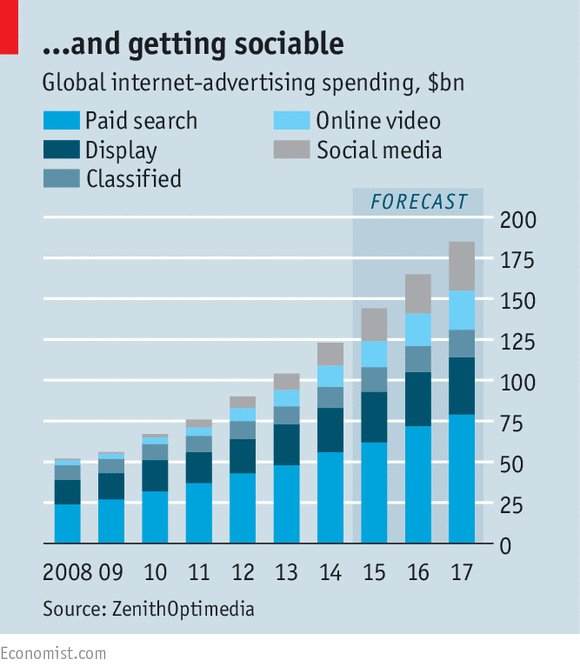
Sunday, August 30, 2015
Do Sex & Violence Actually Sell?
http://theconversation.com/do-sex-and-violence-actually-sell-45138

From a practical standpoint, this suggests that advertisers may not get the best return on investment by advertising in violent or sexual contexts. Although such contexts may attract large audiences, the apparent advantages of more overall viewers may be offset by lower brand memory, less favorable attitudes and lower buying intentions.

Saturday, August 29, 2015
Television - Hunted: could you go on the run in Britain's extreme surveillance state?
http://www.theguardian.com/tv-and-radio/2015/aug/29/hunted-channel-4-surveillance-show-reality-hacking

During the longueurs while they were laying low – “There’s no Netflix when you’re on the run” – the pair spent a lot of time thinking about how profligate they were with their personal data. “My concern is that there’s always a wealth of knowledge out there, like your shopping habits,” says Harry. “And we have no consciousness of what’s happening with that information. It’s actually changed how I communicate online.”

During the longueurs while they were laying low – “There’s no Netflix when you’re on the run” – the pair spent a lot of time thinking about how profligate they were with their personal data. “My concern is that there’s always a wealth of knowledge out there, like your shopping habits,” says Harry. “And we have no consciousness of what’s happening with that information. It’s actually changed how I communicate online.”
Thursday, August 27, 2015
Virtual reality - Grand illusions
http://www.economist.com/news/science-and-technology/21662481-virtual-reality-flopped-1990s-time-its-differentapparently-grand

Each firm hopes that its headset will become next year’s big consumer product for geeky early-adopters. So far none has announced prices, but a few hundred dollars for a full rig seems a good bet. That is well within the means of many people of the sort likely to be attracted to VR, and has led some to suggest it will be the Next Big Thing in consumer electronics. Digi-Capital, a consultancy in San Francisco, reckons the market for virtual reality could be worth $30 billion a year by 2020—if, of course, people actually want to buy it.

Each firm hopes that its headset will become next year’s big consumer product for geeky early-adopters. So far none has announced prices, but a few hundred dollars for a full rig seems a good bet. That is well within the means of many people of the sort likely to be attracted to VR, and has led some to suggest it will be the Next Big Thing in consumer electronics. Digi-Capital, a consultancy in San Francisco, reckons the market for virtual reality could be worth $30 billion a year by 2020—if, of course, people actually want to buy it.
Marketing in the digital age - A brand new game
http://www.economist.com/news/business/21662543-people-spend-more-time-social-media-advertisers-are-following-them-brand-new-game


Even if marketers master social media without coming across as clumsy, grating or intrusive, there will surely be a limit to how much advertising will shift to the platforms. Television ads are still great for reaching big audiences with simple messages. Print ads can lend brands an air of credibility (we would say that, wouldn’t we?). Like fund managers, advertisers will always want a balanced portfolio.


Even if marketers master social media without coming across as clumsy, grating or intrusive, there will surely be a limit to how much advertising will shift to the platforms. Television ads are still great for reaching big audiences with simple messages. Print ads can lend brands an air of credibility (we would say that, wouldn’t we?). Like fund managers, advertisers will always want a balanced portfolio.
Tuesday, August 25, 2015
Ukrainian director's courtroom speech
http://www.theguardian.com/world/2015/aug/25/ukrainian-film-maker-jailed-oleg-sentsov-20-years-speech#comment-58176771

I have already spent one year in your wonderful country and I have watched your television. The [news] programs Vesti and Vremya are very good shows. All of your propaganda is working excellently. Most of the Russian population believes what they are saying. Putin is great. There are fascists in Ukraine. Russia is never wrong. There are enemies everywhere. This is very good propaganda.
But I also understand that there are people who are smarter – such as you, for instance, here – who support the government. You perfectly well understand that there are no fascists in Ukraine. That Crimea was annexed illegally. That your troops are fighting in Donbass [a claim Russia has repeatedly denied]. Even I – sitting here in prison – know that your troops are fighting in Donbass.

I have already spent one year in your wonderful country and I have watched your television. The [news] programs Vesti and Vremya are very good shows. All of your propaganda is working excellently. Most of the Russian population believes what they are saying. Putin is great. There are fascists in Ukraine. Russia is never wrong. There are enemies everywhere. This is very good propaganda.
But I also understand that there are people who are smarter – such as you, for instance, here – who support the government. You perfectly well understand that there are no fascists in Ukraine. That Crimea was annexed illegally. That your troops are fighting in Donbass [a claim Russia has repeatedly denied]. Even I – sitting here in prison – know that your troops are fighting in Donbass.
[They] understand what is happening in the world – what horrible crimes your leadership is committing.
[...] But besides all these people, there is yet another part of the Russian population that knows perfectly well what is going on. But these people are afraid of something. They think that nothing can be changed. That everything will continue as it is. That the system cannot be broken. That they are alone. That there are few of us. That we will all be thrown into prison. That they will kill us, destroy us. And they sit quietly, as mice in their holes.
We also had a criminal regime, but we came out against it. They didn’t want to listen to us – so we beat on trash cans. They didn’t want to see us – so we set tyres on fire. In the end, we won.
The same thing will happen with you, sooner or later. I don’t know what form it will take and I don’t wish to see anyone suffer. I simply wish for you to no longer be governed by criminals.
[...] But besides all these people, there is yet another part of the Russian population that knows perfectly well what is going on. But these people are afraid of something. They think that nothing can be changed. That everything will continue as it is. That the system cannot be broken. That they are alone. That there are few of us. That we will all be thrown into prison. That they will kill us, destroy us. And they sit quietly, as mice in their holes.
We also had a criminal regime, but we came out against it. They didn’t want to listen to us – so we beat on trash cans. They didn’t want to see us – so we set tyres on fire. In the end, we won.
The same thing will happen with you, sooner or later. I don’t know what form it will take and I don’t wish to see anyone suffer. I simply wish for you to no longer be governed by criminals.
Saturday, August 22, 2015
How Amazon is taking over television
http://www.telegraph.co.uk/culture/tvandradio/11815178/How-Amazon-is-taking-over-television.html
But why is Amazon muscling its way into film and television? And what will it mean for viewers? The answer to the first question is simple: it is doing it because it can. Over the last five years a technological revolution has seen more and more people watching their favourite films and television shows over the internet. Instead of waiting for a time in the week when a broadcaster deigned to show the next episode in a particular series, viewers now have the opportunity to watch programmes or movies at a time and a place of their choosing, whether that be in their living room between nine and 10 o’clock on a Tuesday evening or under a tree in their local park on a Sunday afternoon.
Friday, August 21, 2015
Thursday, August 20, 2015
Drunken Nation: Russia’s Depopulation Bomb
http://www.worldaffairsjournal.org/article/drunken-nation-russia’s-depopulation-bomb

Putin’s Kremlin made a fateful bet that natural resources—oil, gas, and other extractive saleable commodities—would be the springboard for the restoration of Moscow’s influence as a great power on the world stage. In this gamble, Russian authorities have mainly ignored the nation’s human resource crisis. During the boom years—Russia’s per capita income roughly doubled between 1998 and 2007—the country’s death rate barely budged. Very much worse may lie ahead. How Russia’s still-unfolding demographic disaster will affect the country’s domestic political situation—and its international security posture—are questions that remain to be answered.

Putin’s Kremlin made a fateful bet that natural resources—oil, gas, and other extractive saleable commodities—would be the springboard for the restoration of Moscow’s influence as a great power on the world stage. In this gamble, Russian authorities have mainly ignored the nation’s human resource crisis. During the boom years—Russia’s per capita income roughly doubled between 1998 and 2007—the country’s death rate barely budged. Very much worse may lie ahead. How Russia’s still-unfolding demographic disaster will affect the country’s domestic political situation—and its international security posture—are questions that remain to be answered.
Friday, August 14, 2015
Monday, August 10, 2015
The World Hates Russia. Russia Hates It Back
http://www.bloombergview.com/articles/2015-08-05/the-world-hates-russia-russia-hates-it-back-
"Russia is spending more than one-half billion dollars annually to mislead audiences, to sow divisions, to push conspiracy theories out over RT television." The money might be spent just as wisely buying more $600,000 watches for Putin's press secretary, Dmitri Peskov.

"Russia is spending more than one-half billion dollars annually to mislead audiences, to sow divisions, to push conspiracy theories out over RT television." The money might be spent just as wisely buying more $600,000 watches for Putin's press secretary, Dmitri Peskov.

Wednesday, August 5, 2015
How to beat Vladimir Putin in the battle for hearts and eyeballs
http://www.ft.com/intl/cms/s/0/1680e214-35f6-11e5-bdbb-35e55cbae175.html#axzz3hxO3E9Xa
Kremlin media, however, ignore local news and social issues....experts recommended a news agency or news hub to focus on the details Moscow wants to avoid. They might not be able to convince audiences who downed MH17, but by focusing on local stories about hospitals, schools and courts they could prove more relevant. A content factory could also provide socially engaged documentary material: docu-soaps about schools or hospitals; reality shows exploring ethnic tensions. Local broadcasters need help, both financial and professional, to create such high-quality content. It is something the British especially, with their sophisticated TV industry, should take the lead on.
Kremlin media, however, ignore local news and social issues....experts recommended a news agency or news hub to focus on the details Moscow wants to avoid. They might not be able to convince audiences who downed MH17, but by focusing on local stories about hospitals, schools and courts they could prove more relevant. A content factory could also provide socially engaged documentary material: docu-soaps about schools or hospitals; reality shows exploring ethnic tensions. Local broadcasters need help, both financial and professional, to create such high-quality content. It is something the British especially, with their sophisticated TV industry, should take the lead on.
Saturday, August 1, 2015
From horseless to driverless
http://worldif.economist.com/article/11/what-if-autonomous-vehicles-rule-the-world-from-horseless-to-driverless
Car-lovers will doubtless mourn the passing of machines that, in the 20th century, became icons of personal freedom. But this freedom is illusory. The empty roads seen in car advertisements are not most people’s experience of driving. In a driverless future, people will come to wonder why they tolerated such a high rate of road deaths, and why they spent so much money on machines that mostly sat unused. A world of self-driving vehicles may sound odd, but coming generations will consider the era of car ownership to have been much stranger.
Car-lovers will doubtless mourn the passing of machines that, in the 20th century, became icons of personal freedom. But this freedom is illusory. The empty roads seen in car advertisements are not most people’s experience of driving. In a driverless future, people will come to wonder why they tolerated such a high rate of road deaths, and why they spent so much money on machines that mostly sat unused. A world of self-driving vehicles may sound odd, but coming generations will consider the era of car ownership to have been much stranger.
Subscribe to:
Posts (Atom)




